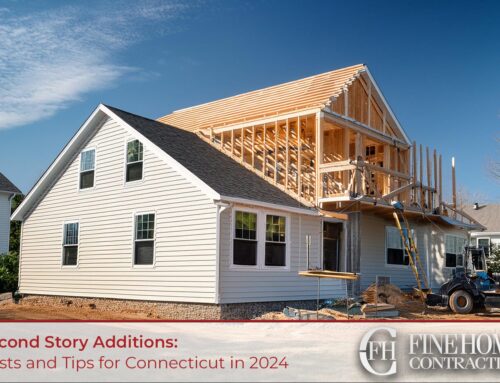Congratulations on becoming a new homeowner! Owning your own home can be an incredibly rewarding experience, but it also comes with its fair share of responsibilities. One of the most important things you’ll need to do as a homeowner is contract out and complete necessary home improvement projects. Whether it’s a full-scale remodel or a minor repair, home contracting projects can be time-consuming and overwhelming, especially if you’re new to the process. In this article, we’ll provide you with some tips and tricks to help ensure your home contracting project goes smoothly. From planning and budgeting to hiring a contractor and managing the project, we’ve got you covered.
1. Planning your home contracting project
As a new homeowner, the idea of starting a contracting project can be daunting, but with proper planning, it can be a smooth and exciting process. To start, assess your needs and set your goals. Do you want to renovate, remodel, or add a new section to your home? Knowing what you want to achieve will help you create a project plan and timeline. This plan will help you stay focused and organized throughout the project. Lastly, choose a design and style that reflects your personality and complements your home’s overall aesthetic.
2. Hiring the right contractor
Finding the right contractor can be the make or break of your home contracting project. Research potential contractors, read reviews, and ask for references. Take a look at their past work to get a sense of their skill level and style. When you find the right contractor, make sure to understand their contract and agreements thoroughly. Communication is key, discuss expectations, and ensure that everything is in writing before starting the project.
Further Reading on Qualifying Contractors:
Biggest Red Flags To Look Out For When Hiring a Contractor – Fine Home Contracting.com
3. Estimating costs and budgeting
It’s essential to break down the costs of your home contracting project to create a realistic budget. Understand the materials, labor, and unexpected costs involved in the project. Stick to the budget and track expenses along the way. Be prepared to adjust your budget as needed. Diligent budgeting will save you time and money in the long run. We always recommend having 3 separate contractors quote any project to give you a variety of price points to compare.
4. Understanding building codes and zoning laws
Before starting the project, research building codes and zoning laws for your area. Every city and state has different regulations and permits required for specific projects. Ensure that your project meets these requirements and is up to code. Following these regulations will not only protect you legally but also give you peace of mind knowing that your home is safe and secure.
To find zoning information for your particular town in Connecticut, we recommend the list on the State of Connecticut website.
5. Essential tools for home repairs
As a new homeowner, you may find yourself in need of some basic tools for home contracting projects. Here are a few essential tools that every homeowner should have:
Basic tools every homeowner should have:
- Hammer
- Screwdrivers (both Phillips and flathead)
- Pliers
- Tape measure
- Level
- Utility knife
- Adjustable wrench
- Safety glasses
- Gloves
Specialty tools for specific contracting projects:
Depending on the type of project you are undertaking, you may need some specialty tools. These can be rented or borrowed if you don’t want to purchase them outright. Here are a few examples:
- Power drill
- Circular saw or jigsaw
- Nail gun
- Wire stripper
- Pipe wrench
- Tile cutter
Tips for renting or borrowing tools you may not have:
Renting or borrowing tools can be a cost-effective way to get the job done. Here are a few tips for renting or borrowing tools:
– Check with friends or family members to see if they have the tool you need
– Look for tool rental companies in your area
– Make sure you understand how to use the tool before you rent or borrow it
– Be sure to return the tool on time and in good condition
6. Tips for managing a contracting project
Undertaking a home contracting project can be overwhelming at times. Here are a few tips to help you manage the project effectively:
- Effective communication with your contractor:
Communication is key when working with a contractor. Be sure to discuss your expectations and timeline for the project. Make sure you have a point person for communication on both sides to avoid misunderstandings. - Staying organized and keeping track of progress:
Keep a project binder or spreadsheet to track progress and important information such as permits, inspections, and costs. This will help you stay organized and on top of the project. - Dealing with unexpected setbacks or changes:
Be prepared for unexpected setbacks or changes. Have a contingency plan in place and be flexible. Communicate any changes with your contractor.
7. Common home contracting mistakes to avoid
Home contracting projects can be costly and time-consuming. Here are a few common mistakes to avoid:
- Underestimating costs or time needed for a project:
Be realistic about the costs and time needed for the project. Do your research and get multiple quotes for the work. - Choosing a contractor solely based on price:
Don’t choose a contractor solely based on price. Look for references, reviews, and examples of their work before making a decision. For more information about qualifying a contractor, check out our guide! - Skipping important steps like permits or inspections:
Skipping important steps like permits or inspections can result in costly fines and legal issues. Be sure to follow all necessary steps and obtain any required permits or inspections.
8. Maintaining and updating your home after the contracting project
Once your home contracting project is complete, you’ll want to maintain and update your new space. Here are a few tips:
- Cleaning and maintaining your new home features:
Follow manufacturer guidelines for cleaning and maintaining any new home features, such as appliances, countertops, and flooring. - Decorating and updating your home’s interior design:
Update your home’s interior design to reflect your personal style. This can be as simple as changing out throw pillows or adding a fresh coat of paint. - Planning for future home improvements and renovations:
Think about future home improvements and renovations you may want to undertake. Keeping a list will help you plan and budget for future projects.In conclusion, home contracting projects can be a lot of work, but with the right preparation and knowledge, they can also be an exciting opportunity to improve and personalize your home. By following the tips and tricks outlined in this article, you can ensure that your contracting project is completed successfully and to your satisfaction. Remember to take your time, communicate with your contractor, and stay organized throughout the process. With patience and persistence, you can transform your home into the space of your dreams.







